|
|
|
Sort Order |
|
|
|
Items / Page
|
|
|
|
|
|
|
| Srl | Item |
| 1 |
ID:
172229
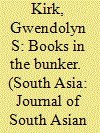

|
|
|
|
|
| Summary/Abstract |
Under United States Public Law 480, a major hallmark of Cold War diplomacy, India received millions of dollars in loans from the US during the 1950s and 1960s in the form of food and agricultural products. A portion of the interest due on this loan was repaid by India partly in the form of books in about two dozen languages which were collected from across South Asia and sent to the Library of Congress and several universities in the country during the heyday of the development of Area Studies. The object of this paper is a large deposit of written material—books, periodicals and ephemera—that was sent to the University of Texas at Austin over a period starting in the 1960s under the PL 480 programme. Most of these materials were added to the library collections, but a large number of them remained uncatalogued for about fifty years in an underground library storage facility in downtown Austin. The history of these materials, and the moment when they reappeared provides a case study of how books are appropriated (or not) into academic, library and political assemblages, and the way disciplines and their canons have been shaped by politics and infrastructure from the Cold War into the neo-liberal age.
|
|
|
|
|
|
|
|
|
|
|
|
|
|
|
|
| 2 |
ID:
122482
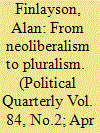

|
|
|
|
|
| Publication |
2013.
|
| Summary/Abstract |
This essay puts into context the debate between Michael Jacobs and Ian Mulheirn, exploring the theories and themes underpinning their arguments, published in issue 84 1 of the Political Quarterly. It discusses, firstly, the roots of Mulheirn's approach in European neoliberalism and, secondly, the roots of Jacobs' approach in a range of sources currently contending for authority over debates within the Labour party. These include themes drawn, broadly, from Polanyi, Keynes, Schumpeter and Schumacher. In a conclusion the article makes the case for a 'pluralistic' to the organisation of political and economic power in the UK.
|
|
|
|
|
|
|
|
|
|
|
|
|
|
|
|
| 3 |
ID:
099898


|
|
|
|
|
| Publication |
2010.
|
| Summary/Abstract |
This article argues that American policy towards Iraq went through four major shifts between the invasion in 2003 and the announcement of the surge in 2007. The best way to understand the Bush administration's evolving policy towards Iraq is by examining the ideological parameters within which it was made. The article assesses various approaches to understanding the relationship between ideology, policy making and foreign policy, concluding that ideology shapes the paradigm and analytical categories within which foreign policy is made. A major change in foreign policy originates either from the decision-maker consciously recognizing and attempting to rework the ideational parameters within which policy is made or in reaction to 'discrepant information' or 'anomalies' that destabilize the paradigm and its analytical categories. The article goes on to examine the extent to which both neo-liberalism and neo-conservatism shaped George W. Bush's foreign policy. It identifies a series of major analytical categories that originate from within these two doctrines and shaped policy towards Iraq. The article argues that the four major shifts in Bush's policy towards Iraq were forced upon the administration by the rising tide of politically motivated violence. Ultimately this violence forced Bush to abandon the major analytical categories that, up to 2007, had given his policy coherence. In order to extricate his administration from the quagmire that Iraq had become by 2006, Bush totally transformed his approach, dropping the previously dominant neo-liberal paradigm and adopting a counter-insurgency doctrine.
|
|
|
|
|
|
|
|
|
|
|
|
|
|
|
|
| 4 |
ID:
116034


|
|
|
| 5 |
ID:
106762


|
|
|
| 6 |
ID:
140461


|
|
|
|
|
| Summary/Abstract |
Highlighting legal–governmental techniques by which the public is conceptualised as the market and market activity as public agency, this article poses India as a key site for a globalised analysis of neo-liberal governance. It opens a genealogy for India's ‘emerging market’ governance that extends back to colonial modernisation, highlighting ties between a coercive state, its benevolent performance and the making of a market society. Such a long view challenges the free market vs. strong state opposition so central to contemporary neo-liberal thought. It also calls attention to the nexus between powers of emergency and emerging markets. Elaborating, the essay engages Foucault's analysis of neo-liberal political economy to read recent Indian jurisprudence on financial markets, the rule of law, and public interest.
|
|
|
|
|
|
|
|
|
|
|
|
|
|
|
|
| 7 |
ID:
109758


|
|
|
| 8 |
ID:
141001


|
|
|
|
|
| Summary/Abstract |
It would be strange, to say the least, to speak about Marxism as a progressive or even influential theoretical school in Eastern Europe after the collapse of the Soviet bloc in 1989-1991. Marxist ideas have come to be associated with the repressive practices of the totalitarian Stalinist era, the failed Soviet economy and the conservative, nostalgic views of the older generation and a small segment of the youth that failed to integrate into the market economy. Naturally, this attitude to Marxist theory was typical for the former communist countries that rapidly transitioned from a Soviet-style managed economy to neoliberal capitalism. The word "socialism" was largely discredited in these countries.
|
|
|
|
|
|
|
|
|
|
|
|
|
|
|
|
| 9 |
ID:
173794
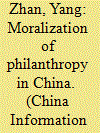

|
|
|
|
|
| Summary/Abstract |
Neo-liberalism shifts social responsibility to individuals. The practice of neo-liberal governmentality in China confirms this worldwide trend. This is evident when government retreats from the responsibilities of providing social welfare for rural migrant workers and leaves them to privately funded philanthropy programmes. However, the Chinese case also presents an anomaly in that the shifting of responsibilities under neo-liberalism results not only in individualization, but also in mutual obligations created by moralization. This article explores philanthropy programmes in migrant settlements in contemporary Beijing within a larger neo-liberal context. It provides an ethnographic account of the moralization process informed by the culturally specific notion of aixin (爱心), or loving heart. I argue that moralization within philanthropy programmes is crucial in reconfiguring the modes of responsibility in post-socialist China. Here, social obligations and consolidation of old hierarchies and social inequalities go hand in hand with social individualization.
|
|
|
|
|
|
|
|
|
|
|
|
|
|
|
|
| 10 |
ID:
107691


|
|
|
|
|
| Publication |
2011.
|
| Summary/Abstract |
This article examines the influence of neoliberalism on President Barack Obama's foreign policy agenda and reengagement policy in East Asia. Using the basic tenets of neoliberalism, it critiques the Bush administration's post 9/11 foreign policy. It also compares neoliberalism and realism/neoconservatism as U.S. foreign policy approaches to the security challenges of the twenty-first century. The article goes on to analyze the ideological perspective of President Obama's foreign policy agenda in East Asia. Obama's apparently neoliberal campaign statements and official pronouncements are concretized in his actual foreign policy decisions and actions. This new mode of conducting foreign policy has strengthened Washington's relations with its Asian friends and allies, but has complicated U.S.-China relations. In conclusion, the article contends that the realization of the neoliberal agenda in U.S. foreign policy in East Asia is contingent on four factors: prioritization of East Asia over other pressing foreign policy concerns; the competence and skills of the Obama administration's key foreign policy advisers; U.S. economic recovery and renewed competitiveness; and President Obama's reelection in 2012.
|
|
|
|
|
|
|
|
|
|
|
|
|
|
|
|
| 11 |
ID:
092987
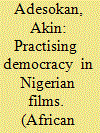

|
|
|
|
|
| Publication |
2009.
|
| Summary/Abstract |
This article discusses the response of 'Nollywood' to the transformation of Nigeria's social structure through the economic and political regimes of global neo-liberalism and Nigeria's military rule, and the aesthetic possibilities enabled by video and digital technologies. Approaching Nollywood as a new cinematic form which results from the collapse of the middle classes due to radical economic reforms, the article looks at two films, Akobi Gomina ('The Governor's Heir', 2002) and Agogo Eewo ('The Sacred Gong', 2002) to demonstrate the implications of this phenomenon in the changing socio-political structure crystallized with the advent of the Fourth Republic in 1999. In these works of explicit and oblique political commentary, which present us with intimations of the genre of 'democracy films', the idea of a public receptive to mutually recognized cultural or personal symbols is used to develop new aesthetic modes in films. But these film-making practices also circumscribe the possibilities of an ideologically progressive cinematic practice. Thus, a form originating partly from an economic context appears caught in an aesthetic impasse, but the article suggests that the tendency in Nollywood toward generic proliferation might represent one path out of the impasse.
|
|
|
|
|
|
|
|
|
|
|
|
|
|
|
|
| 12 |
ID:
113767


|
|
|
|
|
| Publication |
2012.
|
| Summary/Abstract |
This essay takes as its starting point the precipitous fall of Bo Xilai in March 2012 and discusses the context of the abiding significance of China's red legacies, in particular Maoism, in understanding the People's Republic of China today. While thinkers labour to salvage Marxism, the red legacy constitutes a body of cultural, intellectual, and linguistic practices that are profoundly ingrained in institutional behaviour in China. This study explores to what extent this version of the red legacy leeches out the power of other modes of leftleaning critique and independent thought, and abets the party-state in its pursuit of a guided, one-party neo-liberal economic agenda.
|
|
|
|
|
|
|
|
|
|
|
|
|
|
|
|
| 13 |
ID:
088101


|
|
|
|
|
| Publication |
2009.
|
| Summary/Abstract |
This article develops a twofold critique: on the one hand it addresses those accounts commonly associated with the Varieties of Capitalism literature and their associated understanding of neo-liberalism to argue that there is a dominant tendency to collapse into a binary analysis that asserts either we are witnessing convergence or we are experiencing path dependency. On the other hand it addresses 'neo-Gramscian' accounts which tend to overemphasise processes of transnational convergence and the emergence of a transnational capitalist class at the expense of the embeddedness of capital in national-domestic contexts. On this basis, it is argued that several contributions within political geography pose meaningful questions about the premise that neo-liberalism is inherently variegated. Principally, this involves developing the notion of variegated neo-liberalism to analyse the dynamics of a contingent neo-liberal consensus between transnationally-oriented fractions that both drives EU reform in a neo-liberal direction and reinforces domestic linkages organic to the national context. As a result, the article suggests we therefore reject the notion of a transnational capitalist class somehow detached from the national.
|
|
|
|
|
|
|
|
|
|
|
|
|
|
|
|
| 14 |
ID:
108921
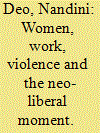

|
|
|
|
|
| Publication |
2011.
|
| Summary/Abstract |
One of the surprising effects of neo-liberalism has been to shift progressive politics away from labour organizing towards NGO-led campaigns against social harms. Reading labour histories and feminist histories together, it is argued that the new politics of resistance needs a new language which combines broad feminist analysis with grassroots labour organizing strategies.
|
|
|
|
|
|
|
|
|
|
|
|
|
|
|
|
| 15 |
ID:
114871


|
|
|
|
|
| Publication |
2012.
|
| Summary/Abstract |
This paper presents some related processes in Turkey which have been initiated or influenced by the World Bank's execution of the Social Risk Mitigation Project (SRMP). It argues that the Justice and Development Party (AKP), as a party that redefined social assistance as charity by incorporating Islamic values with neo-liberalism, benefited from the SRMP for increasing its public support. It also demonstrates how the AKP's use of this project for its political aims led to some unintended consequences, causing the production and spreading of discourses about the poor, the Kurdish population and the emergence of a culture of poverty in the country.
|
|
|
|
|
|
|
|
|
|
|
|
|
|
|
|
|
|
|
|
|